How 4 Children Miraculously Survived 40 Days in the Amazon Jungle After a Fatal Plane Crash
Even when the rest of the news is at its grimmest, wonders never cease.
And the June 9 rescue of four children who spent 40 days on their own in the Amazon jungle after surviving a plane crash was a solid reminder that hope finds a way.
"First of all, the wish to maintain their lives," Colombia's Joint Command of Special Operations head Gen. Pedro Sánchez told NBC News' TODAY, explaining the seemingly miraculous circumstances that resulted in the kids being found in relatively good condition. "The second one, they are Indigenous people, so they have immunity to so many hazards inside the jungle. And third one, they know the jungle."
Soldiers and volunteers from local Indigenous tribes searched more than 1,600 miles of dense Amazonian rainforest over the course of six weeks after the single-engine Cessna ferrying the siblings, their mother and an uncle crashed on May 1, according to officials.
Lesly Jacobombaire Mucutuy, 13, Soleiny Jacobombaire Mucutuy, 9, Tien Noriel Ranoque Mucutuy, 4, and Cristin Neriman Ranoque Mucutuy, 11 months, were the sole survivors.
Celebrity Deaths: 2023's Fallen Stars
"They themselves are an example of survival that will go down in history," Colombia's president, Gustavo Petro, said at a June 9 news conference. "Today, those children are the children of peace and the children of Colombia."
The true state of the kids' health, particularly their mental well-being, won't be known for some time, Petro acknowledged, but the leader said they would get the care they needed.
Tien and Cristin's father, Manuel Ranoque, called the children's safe return "a miracle of God." But while their rescue may have more than a tinge of the mysterious, what we do know about how Lesly, Soleiny, Tien and Cristin survived on their own in the jungle can't help but awe and inspire.
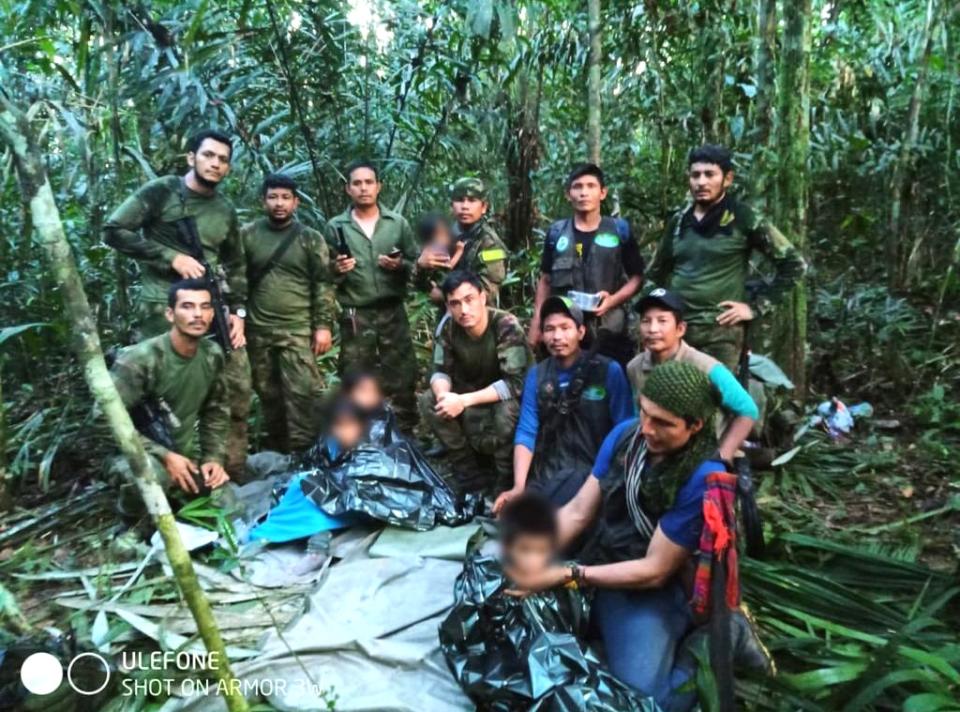
What were the circumstances of the May 1 plane crash in the Colombian Amazon?
On the morning of May 1, a single-engine propellered Cessna aircraft carrying Magdalena Mucutuy, her four kids and one of their uncles took off from the remote Amazonian village of Araracuara and headed northward to the town of San José del Guaviare.
According to aviation authorities, pilot Hernando Murcia radioed to air traffic control at 7:43 a.m. that they were experiencing engine failure. Shortly afterward the plane went off radar and crashed into a jungle-covered area about 110 miles away from its destination.
Magdalena initially survived, according to Manuel, who told reporters that Lesly had said their mother lived for about four days. "Before she died," he said, "their mom told them something like, 'You guys get out of here.'"
By the time a search team came across the wreckage and recovered the bodies of the three adults on May 16, the kids were nowhere to be found.
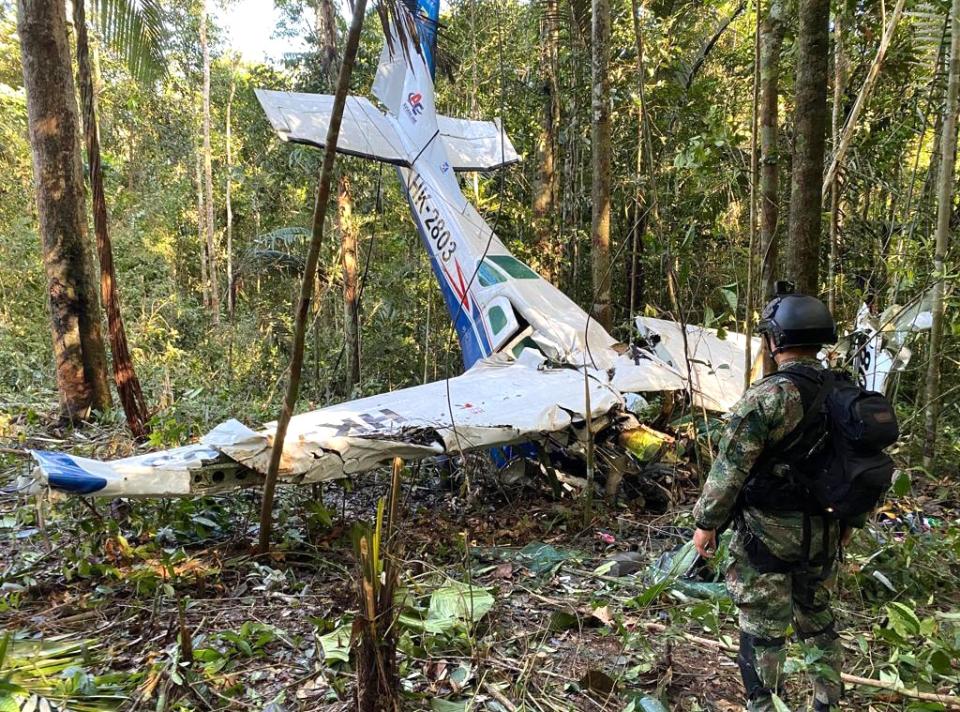
What happened during the search for the child crash survivors in the Amazon?
Once they realized that the children were out there somewhere, "We moved on, to a second phase," 1st Vice Sgt. Juan Carlos Rojas Sisa explained to the Associated Press. "We went from the stealth part to the noise part so that they could hear us."
In a rare display of unity for two factions with a historically antagonistic relationship, at least 150 members of the Colombian army were joined by more than 70 volunteers from local tribes to search the surrounding jungle, their common purpose outweighing politics.
The May 30 discovery of a pair of footprints believed to belong to 13-year-old Lesly renewed hopes the kids would be found alive, Gen. Sénchez, who presided over the search operation, told the AP at the time.
As they combed the jungle, troops came across used diapers, partially eaten fruit, a baby bottle and a tiny pair of shoes, signs the siblings were on the move and their search wasn't in vein. They roped off and left whistles anywhere it appeared the children had passed through, in case the kids returned to the area.
16 of TV's Greatest and Most Frustrating Unsolved Mysteries From Lost and Beyond
"We have a 100 percent expectation of finding them alive," Sánchez said. But, he added, "It's not like finding a needle in a haystack, it's like finding a tiny flea in a huge rug that moves in unpredictable directions."
The general described the challenges his troops (and therefore the siblings) were facing: up to 16 hours of rain a day, poisonous snakes, jaguars and other wild animals, disease-carrying mosquitos and dense rainforest that even a trained soldier could find difficult to navigate.
Soldiers dropped boxes of food around the jungle and, so the searches could continue at night, planes fired flares into the darkness to light up the ground below. Search helicopters blasted out a message recorded by the children's grandmother, Fátima Valencia, in both Spanish and their native Huitoto language telling them to stay still, wherever they were, so help could find them.
Did ayahuasca factor into the search for the children in the Amazon?
On June 8, Tien and Cristin's father joined tribe members who volunteered for the search in a centuries-old indigenous ritual: They drank yagé—or ayahuasca, as the hallucinogenic herbal concoction is more popularly known—in hopes of having a vision that would help them find the children.
"I told them, 'There's nothing to do here. We will not find them with the naked eye. The last resource is to take yagé,'" volunteer Henry Guerrero, whose aunt brewed the yagé for the group, told the AP. "The trip really takes place in very special moments. It is something very spiritual."
Tribal elder José Rubio predicted the next morning—after having a number of dreams and promptly vomiting, a common side effect—that the children would be found that very day.
And they were.
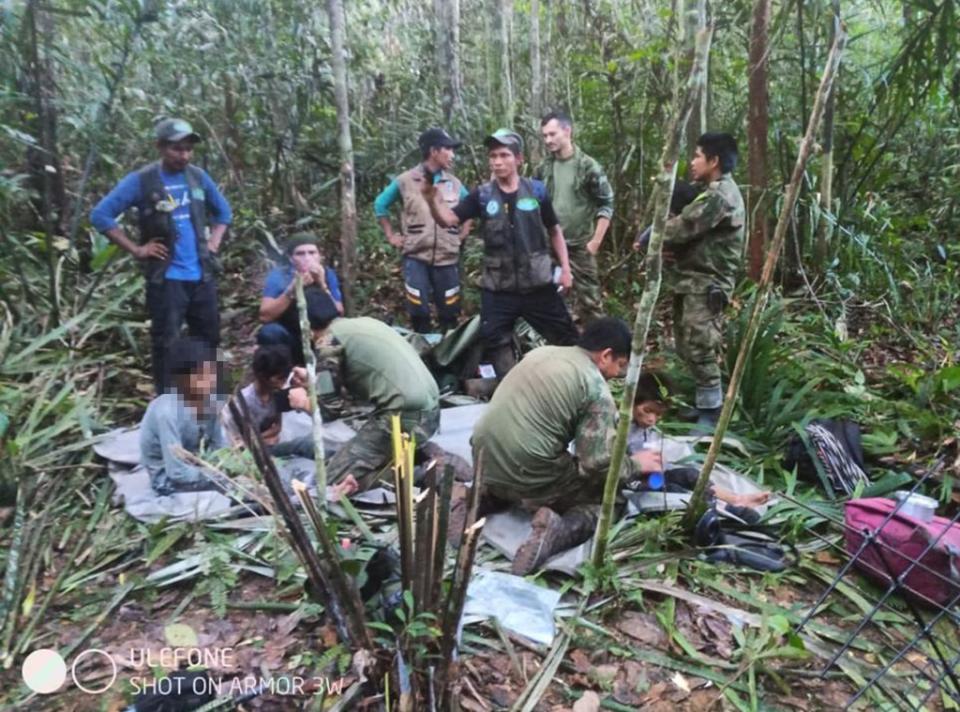
How were the four children lost in the Amazon ultimately rescued?
On June 9, soldiers found Lesly, Soleiny, Tien and Cristin about three miles away from the crash site camping in a small clearing near a river, using equipment Lesly had salvaged from the wreckage. Authorities said that the kids had heard their grandmother's voice coming from above and stayed put.
Since the crash, Tien's 5th birthday had passed and Cristin had turned a year old.
Sánchez told reporters that search teams had come within 70 to 160 feet of the kids several times during the past month without seeing them. "The minors were already very weak," he said, "and surely their strength was only enough to breathe or reach a small fruit to feed themselves or drink a drop of water in the jungle."
An air force video played by news outlets showed rescuers using long lines to get the kids into a waiting helicopter, the foliage too thick for the aircraft to land. Photos taken on the ground showed troops and volunteers with the children wrapped in blankets, with one soldier giving Cristin a bottle.
How did the four Mucutuy siblings survive in the Amazon jungle on their own for 40 days?
Lesly, Soleiny, Tien and Cristin were being treated for dehydration and they couldn't eat solid food yet, Defense Minister Iván Velásquez Gómez said after the children had been transported to a military hospital in the Colombian capital of Bogotá. But, he noted, their condition was "acceptable" considering what they'd been through.
Lesly packed up cassava flour from the plane and, when that ran out, "they began to eat seeds," uncle Fidencio Valencia told reporters, and the children hid in tree trunks to shield themselves from animals.
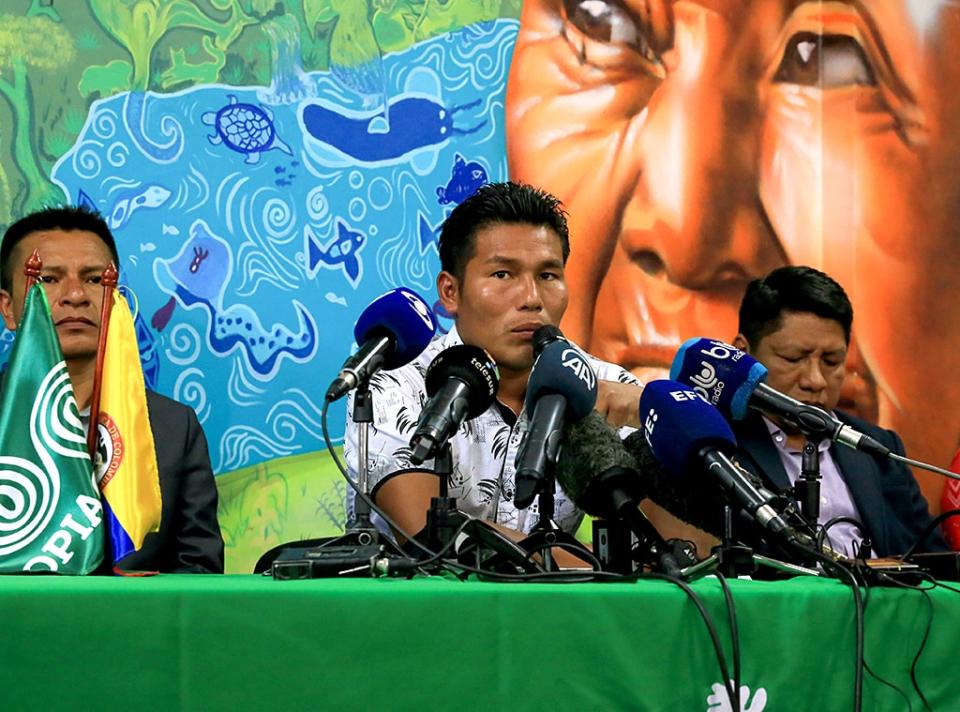
Grandfather Narciso Mucutuy said that Lesly fed Cristin baby formula she'd taken from the plane, and after that was used up she gave her sister water. "The day they were found," he said, Lesly "was very tired and couldn't walk anymore."
The teen was carrying the baby and holding her other sister's hand when rescuers arrived and "they ran to hug me," Indigenous Guard member Nicolas Ordonez told reporters in Spanish, per NBC News. "I received the little girl in my arms, and Lesly said, 'I'm hungry.'"
Their grandma told AFPTV that Lesly was used to caring for her siblings and was well-schooled in what was safe to eat—or what to avoid—in the jungle.
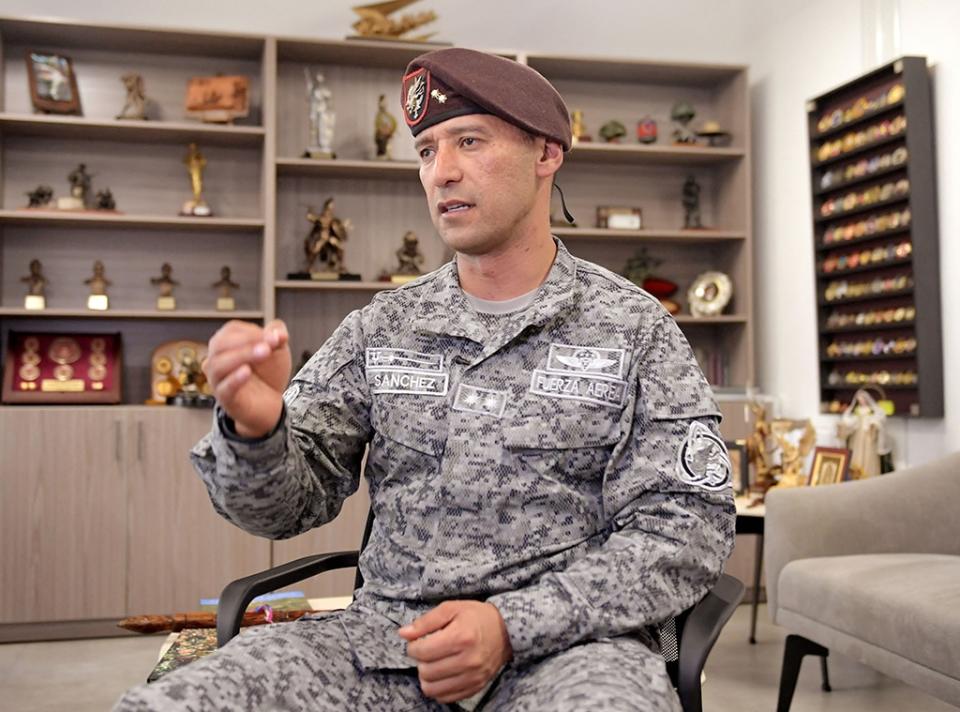
Sánchez agreed that the children's background had been key to living through their ordeal. They knew "how to survive in the jungle," he told NBC News, "how to eat, how to drink, stay against the hostile jungle and how to protect from the rain, because 16 hours a day it's only rain."
"The work between armed forces and Indigenous communities—who obviously know the jungle better than we do—that work was successful," the general concluded. "Indigenous communities and the military found the children."
But the siblings "were the bravest ones," he told reporters right after the rescue. "They didn't have the equipment, the technology nor the capacity we deployed. They only had what we called a will to live."
What happened to Lesly, Soleiny, Tien and Cristin after they were rescued from the Amazon jungle?
Family members told the local and international media outlets that flocked to Bogotá that the children were expected to remain in the hospital for at least two weeks.
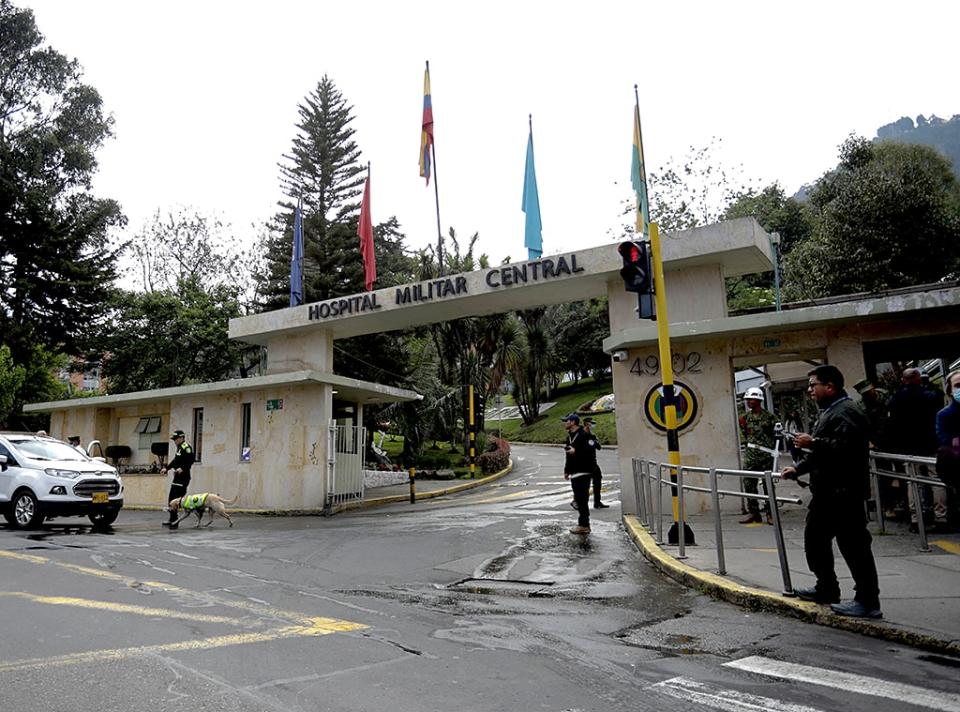
"They speak little and are weak," Colombian Institute of Family Welfare general director Astrid Cáceres told reporters. "They don't talk as much as we would like them to. So let's give them some time."
Their uncle said that the four were happy to see family and they were all taking a "day-by-day" approach to the situation. The kids were still only eating "a little," he noted, "but they are eating."
And, he added, they were drawing pictures, "to let off steam." Written on one of the drawings captured by news cameras: "Siempre bendecida," which means "always blessed."
Another uncle, Dairo Juvenal Mucutuy, told a reporter that his nephew had asked for shoes and wanted to walk, but said his feet hurt.
Dairo said he told the child that, once he was better, they'd play soccer together.

